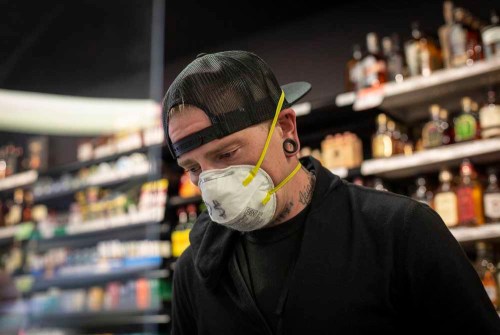Masks still voluntary in Oregon as other states increasingly require them to slow coronavirus spread
Published 11:00 am Thursday, April 16, 2020

- Dustin Anderson wears a face mask and gloves, and stands behind a plastic barrier, while working at the Cedar Mill Liquor Store in Portland on March 26, 2020. Gov. Kate Brown is expanding Oregon’s statewide face mask policy, requiring that most Oregonians wear masks in outdoor situations when they cannot stay six feet from other people.
PORTLAND — As other cities and states across the nation begin requiring mandatory masks in public spaces, Oregon has allowed the decision to remain voluntary.
New York Gov. Andrew Cuomo on Wednesday ordered residents to wear masks in stores, public transportation or on crowded sidewalks. Pennsylvania has ordered masks to be worn by workers and customers in essential businesses. So have Los Angeles, Maryland and New Jersey.
Trending
Oregon has left it as a recommendation, even with new cases continuing to be found as the virus spreads amid the unprecedented statewide shutdown. State estimates show there could currently be as many as 7,000 cases statewide, the vast majority of which have not been found because of a lack of testing.
Oregon health officials are drafting plans that could require masks to be worn when businesses reopen, Nik Blosser, the chief of staff to Gov. Kate Brown, told The Oregonian/OregonLive on Tuesday.
Asked why masks aren’t currently being required, Blosser replied: “I think that’s a fair question.”
“It’s certainly something we can have our medical advisory panel look at,” Blosser said, referring to the panel of doctors that’s advising the governor.
Simple masks aren’t designed to keep their wearers from catching the virus, but instead to reduce the transmission of virus-laden droplets generated if they are unwittingly carrying it and cough, sneeze or simply talk.
Chunhuei Chi, director of the Center for Global Health at Oregon State University, said wearing masks has been an important tool to control the spread in Taiwan, a country of 23 million people that has been able to keep its case count below 400. They’re required in schools, churches and public places like transit.
Trending
In the United States, Chi said, “we have neglected it for over two months.”
The risk, Chi said, is that asymptomatic people can spread the disease in public — a danger underscored by the story reported Monday of a Redmond man who had been staying at home but still ended up in an intensive care unit after testing positive for the coronavirus.
“We had been following the recommendations,” the man’s wife, Stephanie Widler, told the Bend Bulletin. “The only place he had been to was the grocery store. He had gotten gas once. In the time frame he didn’t go anywhere.”
A study from Iceland published this week in the New England Journal of Medicine found 43% of people tested there were asymptomatic, though some were possibly tested before developing symptoms. Estimates of the percentage of asymptomatic carriers has continued rising as more has been learned about the novel coronavirus.
“We need to be very cautious. This is a very new disease,” Chi said. “This is the most complex and tricky virus we’ve ever had to deal with.”
Seeing people continue going to grocery stores without wearing masks has left Yvonne Hall feeling unsettled.
Hall, 58, of Yachats, is a former lab technician who suffers from asthma and fears what the coronavirus would do to her lungs if she caught it. Her colds always turn into bronchitis, she said, sometimes into pneumonia.
So since late February, she wears gloves, a lab coat and an old respirator equipped with carbon filters. When she leaves the store, the coat goes into a garbage bag (straight into the washing machine once home), she sprays her gloves with rubbing alcohol (straight into a Ziploc) and she spritzes her shoes with disinfectant. Her approach: Assume everyone and every thing is infected.
“I call it ‘hazmatting up,’” Hall explained.
As in: “I completely hazmat up before I go into the store.”
Her reasons? There was a woman coughing at the deli counter during one store trip, a woman hacking in the produce section in another. Just Monday, she watched a man spit on the sidewalk in front of the Fred Meyer in Florence. “Gross,” she said.
She said she understands why state officials haven’t acted. But she wishes they would.
“They don’t really want to impose that on people, and I get it,” Hall said. “It’s not nice to tell people to do something because people don’t like to be told what to do. But seeing women cough openly and a guy cough today — that’s the risk right there. If those people are COVID positive, even if they don’t know it, they’re spreading it.”
Multnomah County health officials have followed the Centers for Disease Control’s guidance in recommending masks. A county spokeswoman did not respond to questions about why they were not made mandatory in stores and other public spaces where physical distance is not always possible.
Tim Becker, a spokesman for Portland Mayor Ted Wheeler, said the city was following guidance on masks from state and county health officials. “We’ve seen many Portlanders heed that advice,” Becker said. “If we find that we need to take more aggressive measures, we will re-evaluate based on guidance from our public health experts.”
This article was originally published by The Oregonian/OregonLive, one of more than a dozen news organizations throughout the state sharing their coverage of the novel coronavirus outbreak to help inform Oregonians about this evolving heath issue.









